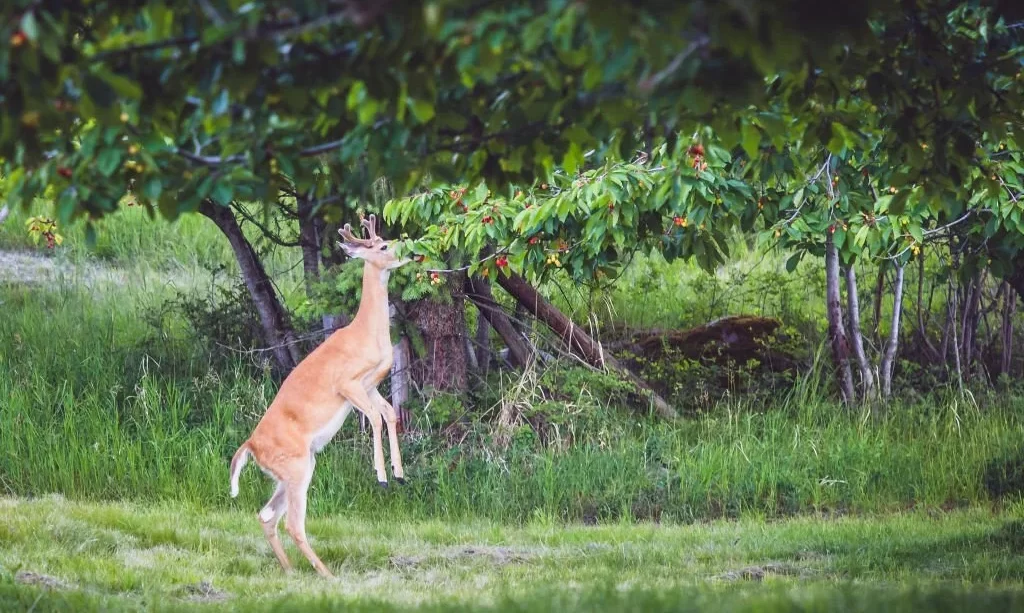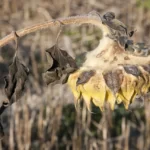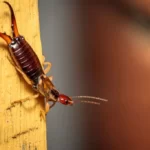When it comes to the world of gardening and orchard management, the presence of deer can raise questions about their dietary preferences and potential impact on fruit-bearing trees. One particular question that often arises is whether deer have an appetite for peaches. In this article, we will explore the intriguing topic of whether deer eat peaches and gain insights into the feeding habits of these graceful yet sometimes troublesome garden visitors. By understanding their behavior, we can better protect our beloved peach trees from potential foraging.
- Seasonal item. Average is 3 peaches per order
- real tree ripe flavor
- sweet & tart flavor
- good for snacks
- high in vitamin C
Deer Feeding Habits
Understanding the dietary habits of deer is essential when considering their potential interest in peach trees. Deer are herbivores, meaning they primarily feed on plant material. Their diet consists of a wide variety of plants, leaves, fruits, and even twigs. However, their preferences can vary depending on the season and the availability of food sources.
During the spring and summer months, when vegetation is lush and abundant, deer tend to graze on fresh greenery, including grasses, leaves, and young shoots. As autumn approaches, their dietary focus shifts towards foraging for fruits and nuts, as these natural sources become more readily available.
Deer are opportunistic feeders, adapting their diet to what is accessible in their environment. This adaptability can make them particularly challenging for gardeners and orchard owners, as they may develop a taste for the fruits growing in your trees.
The Attraction of Peach Trees
Peach trees, known for their sweet and aromatic fruits, can be especially attractive to deer. The allure of ripe peaches lies not only in their enticing scent but also in their succulent taste. The sweetness of peaches, often intensified by the sun’s warmth, can make them a sought-after delicacy for both humans and wildlife.
Deer have keen senses of smell and taste, allowing them to detect the ripeness of fruit from a distance. As peaches ripen and release their tempting fragrance, they may become a target for hungry deer searching for a flavorful treat. Additionally, the juiciness of peaches provides a refreshing source of hydration for these animals.
In the next sections, we will delve into whether deer indeed eat peaches and explore strategies to protect your peach trees from potential deer browsing. Understanding this delicate balance between nature and cultivation is key to maintaining the health and productivity of your orchard.
Do Deer Eat Peaches?
The question of whether deer eat peaches can be answered with a resounding “yes”. Deer are opportunistic feeders, and they are not one to resist the allure of ripe peaches hanging from branches. Gardeners and orchard owners have reported instances where deer have feasted on their peach trees, leaving behind evidence of their foraging.
Deer are particularly attracted to the sweet, juicy flesh of ripe peaches. As these fruits reach their peak ripeness and emit an enticing aroma, they become irresistible to these graceful herbivores. However, it’s important to note that deer may not limit their appetite to just peaches. They may also indulge in other fruit-bearing trees and shrubs if they are present in the same environment.
Strategies to Protect Peach Trees from Deer
To safeguard your precious peach trees from the potential ravages of deer, several effective strategies can be employed:
- Fencing: Installing a sturdy fence around your orchard or garden area is one of the most reliable methods to keep deer at bay. Ensure the fence is tall enough (at least 8 feet) and that it extends below ground to prevent deer from burrowing under it.
- Repellents: Various deer repellent products are available on the market. These can include sprays, granules, or scent deterrents. Apply these products as directed to create an unpleasant sensory experience for deer.
- Motion-Activated Devices: Motion-activated sprinklers and lights can startle deer when they approach, discouraging them from entering your orchard.
- Deer-Resistant Plants: Surround your peach trees with deer-resistant plants. While this won’t guarantee protection, it can make your garden less appealing to deer.
- Tough durable deer netting; Protects landscape and crops from deer and other animals
- Economical, lightweight deer protection; Black UV-resistant deer netting
- Reusable mesh deer fence; Stops deer and other animals from eating shrubs, berries, and vegetables
- Easy to use roll of deer fence netting; Attaches easily to posts and trees
- Do it yourself deer netting for protecting trees, shrubs, orchards and crops
Deer-Resistant Peach Tree Varieties
Some peach tree varieties are less attractive to deer due to their fruit characteristics or natural defenses. Consider planting these varieties if deer are a common concern in your area. Varieties with tougher skin or less aromatic fruit may be less appealing to deer.
Conclusion
In conclusion, deer do indeed eat peaches, and their attraction to these delectable fruits is well-founded. However, with an understanding of deer feeding habits and the implementation of protective measures, you can enjoy the bounty of your peach trees without sharing too much with these graceful garden visitors.
By employing strategies such as fencing, repellents, and the selection of deer-resistant peach tree varieties, you can strike a harmonious balance between preserving your peach harvest and respecting the presence of wildlife in your outdoor space. While deer may occasionally test your defenses, your efforts can help ensure the continued health and productivity of your peach trees.





